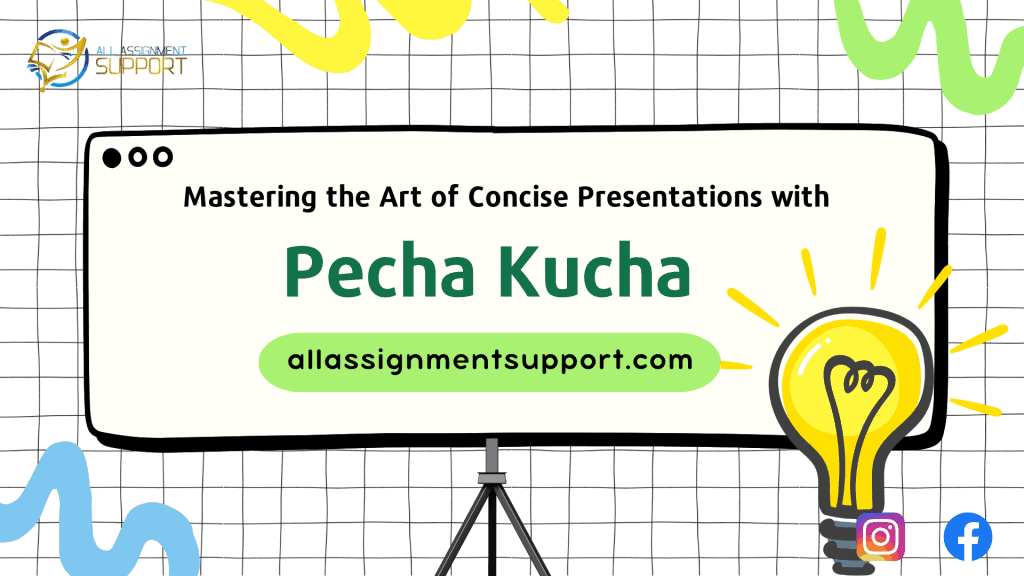Table of Contents
ToggleIntroduction
In today’s world, communicating your message effectively is more critical than ever. Long and wordy presentations often struggle to keep an audience’s attention, and that’s where Pecha Kucha comes in.
Pecha Kucha, a Japanese term meaning “chit-chat,” is a concise and dynamic presentation style that has gained global popularity. It challenges speakers to convey their ideas in just 6 minutes and 40 seconds using 20 slides, each shown for 20 seconds. This format encourages speakers to reach the point and capture their audience’s interest.
Let us explore the world of Pecha Kucha. Whether you’re a business professional, educator, or someone who loves telling stories, mastering the art of Pecha Kucha can significantly enhance your ability to communicate effectively in today’s fast-paced world. So, let’s dive into the fascinating world of Pecha Kucha and see how this straightforward presentation style can help you shine.
The Origins of Pecha Kucha
To truly appreciate the power and significance of Pecha Kucha, it’s essential to journey back to its birthplace, Tokyo, Japan, in the year 2003. This innovative presentation format emerged from the creative minds of two architects, Astrid Klein and Mark Dytham, who were seeking a fresh way to showcase design ideas.
In Japanese, “Pecha Kucha” translates to “chit-chat” or “blah-blah,” and this whimsical name encapsulates the essence of this presentation style perfectly. It was born out of a desire to make presentations more concise, engaging, and visually impactful.
Pecha Kucha’s origins lie in the desire to break free from the constraints of conventional presentations and embrace a format that encourages concise, dynamic, and engaging communication. This visionary approach has made Pecha Kucha a valuable tool for individuals and organizations, helping them share ideas effectively in a world overflowing with information.
The 20×20 Rule
At the heart of the Pecha Kucha presentation format lies a simple yet powerful principle known as the “20×20 rule”. This rule, quite literally, defines what Pecha Kucha is all about 20 slides, each displayed for 20 seconds, resulting in a total presentation time of 6 minutes and 40 seconds.
Let’s break down this rule into its core components:
1. 20 Slides
In a traditional Pecha Kucha presentation, you’re limited to exactly 20 slides. Each slide serves as a visual backdrop to accompany your spoken words, and they progress automatically, one after another, every 20 seconds.
2. 20 Seconds per Slide
The second part of the rule is the 20-second time constraint for each slide. Once a slide appears, you have precisely 20 seconds to convey your message, discuss a concept, or tell a part of your story before it transitions to the next slide.
3. 6 Minutes and 40 Seconds Total Time
When you multiply 20 seconds by 20 slides, you get 400 seconds, which is equivalent to 6 minutes and 40 seconds. This is the total duration of your Pecha Kucha presentation.
The 20×20 rule might seem strict, but it serves a specific purpose. It encourages brevity, precision, and creativity in your presentation. This rule challenges presenters to distill their ideas down to their core essence, focusing on what truly matters.
For those of you who want to the master the art of doing your presentations using the ‘Pecha Kucha’ style, you can login to the internet and download tutorials that can teach you a step by step connotation of how you can go about doing the same in a more concise and professional manner.
Read Also: Mastering Dissertation Length
Benefits of Pecha Kucha
Pecha Kucha, with its unique 20×20 presentation format, offers a host of benefits that make it a compelling choice for presenters and audiences alike. Let’s delve into these advantages to understand why Pecha Kucha has become such a popular and effective communication tool.
Here are some of the exclusive benefits you have connected with Pecha Kucha presentations. Helping you get started with the same:
1. Enhanced Audience Engagement
In an era when attention spans are shrinking, Pecha Kucha excels at keeping audiences engaged. The fast-paced nature of the format means there’s no room for lengthy digressions or boredom. Every 20 seconds, a new slide and idea emerge, maintaining a sense of novelty and preventing mental drift. This continuous flow of information captivates audiences and ensures they stay tuned throughout the presentation.
2. Precision and Clarity
The 20-second constraint per slide forces presenters to be concise and to the point. This precision is invaluable in simply conveying complex ideas. The format compels presenters to distill their messages to their essence, making it easier for the audience to grasp and retain the information presented.
3. Creative Challenge
Limitations can be powerful drivers of creativity, and Pecha Kucha’s time constraints are no exception. Presenters are challenged to think creatively, both in terms of content and slide design. This leads to innovative approaches to storytelling, visual aids, and engaging the audience. It encourages presenters to find new and exciting ways to convey their ideas within strict time limits.
4. Improved Speaker Skills
Mastering the Pecha Kucha format requires presenters to refine their public speaking and time management skills. It encourages them to be more confident, concise, and well-prepared. Over time, this can lead to an overall improvement in their communication abilities.
5. Audience-Friendly
Audiences appreciate Pecha Kucha for its brevity and engaging nature. Due to its clear and structured format, they are more likely to remember key points from a Pecha Kucha presentation. This is especially important in educational and business settings, where retaining information is crucial.
The benefits of Pecha Kucha stem from its ability to captivate audiences, convey information with precision and creativity, and offer a concise and efficient mode of communication.
Pecha Kucha Presentation Essentials
Creating an impactful Pecha Kucha presentation requires careful attention to several key essentials. From slide design to storytelling, here are the elements that will help you master this concise and dynamic presentation format. Let us unveil each of the following:
1. Slide Design:
- Visual Impact: Each slide should have a visually striking element, an image, a minimalistic diagram, or a powerful quote. Visuals should complement your spoken words and enhance understanding.
- Minimal Text: Keep text on each slide to a minimum. A few keywords or a brief phrase can convey your message effectively. Avoid dense paragraphs of text that can overwhelm the audience.
- Consistency: Maintain a consistent design theme throughout your slides. Use the same font, color scheme, and formatting to create a cohesive and polished presentation.
- High-Quality Images: Ensure that any images or graphics you use are high quality and relevant to your message. Blurry or pixelated visuals can detract from your presentation.
2. Crafting Your Story
- Straightforward Narrative: Develop a clear and concise narrative for your presentation. Outline the beginning, middle, and end to guide your audience through your ideas or story.
- Engaging Opening: Start with a captivating hook or question to draw your audience in. Use the first few slides to set the stage and establish the context.
- Transitions: Plan how to transition from one slide to the next smoothly. Ensure your narrative flows logically and each fall leads naturally to the next.
- Firm Conclusion: Summarize your key points and give your audience a memorable closing thought or call to action. A firm conclusion ensures your message lingers in their minds.
3. Rehearsal and Timing
- Practice: Rehearse your presentation multiple times to ensure you can deliver it comfortably within the 20-second timeframe for each slide.
- Timing Tools: Use presentation software with built-in timing tools or set up a timer to practice your timing accurately.
- Pacing: Pay attention to your pacing. Aim for a natural and confident delivery that matches the rhythm of your slides.
- Flexibility: Be prepared to adjust your delivery slightly to accommodate unexpected pauses or technical hiccups during the live presentation.
4. Relevance and Focus
- Stick to the Point: Stay focused on your main message and avoid tangents or unnecessary details. Every slide should contribute directly to your core message.
- Relevance to the Audience: Ensure that your content is relevant and meaningful to your specific audience. Tailor your message to their interests and needs.
Pecha Kucha Ideas and Topics
Let us discover professional tips and techniques on how Pecha Kucha presentations can be done in an effective and in a streamlined manner:
1. Professional Settings
Pecha Kucha presentations have proven to be highly effective in professional settings, where time is often at a premium, and conveying information succinctly is paramount. Here are some Pecha Kucha topics suitable for various professional environments:
A. Business Pitches:
- “Pitching a New Product”: Showcase a new product or service with a focus on its unique selling points and market potential.
- “Effective Sales Techniques”: Share strategies and tactics for successful sales, with a focus on engaging storytelling.
B. Project Updates
- “Project Milestones and Achievements”: Provide a concise update on a project’s progress, highlighting key milestones, challenges, and successes.
- “Data-Driven Decision-Making”: Present how data analysis has influenced project decisions and outcomes.
- Industry Trends:
- “Emerging Trends in [Industry]”: Explore the latest trends and innovations shaping your industry’s future.
- “Disruptive Technologies”: Highlight technological advancements
2. Educational Applications
Pecha Kucha presentations are also valuable tools in educational contexts, both for students and educators. Here are ideas for leveraging Pecha Kucha ideas in education:
A. Student Presentations
- “Book Reports in 20 Slides”: Encourage students to summarize a book’s key themes, characters, and messages in a Pecha Kucha presentation.
- “Scientific Discoveries in History”: Have students present historical scientific breakthroughs in a concise format.
B. Teacher Training
- “Effective Classroom Management”: Provide teachers with strategies for managing classrooms, fostering engagement, and creating a positive learning environment.
- “Incorporating Technology in Education”: Showcase innovative ways to integrate technology into the classroom to enhance learning.
3. Creative Storytelling:
Pecha Kucha isn’t limited to just data and facts; it’s also a powerful tool for creative storytelling. Here are ideas that embrace the artistic side of Pecha Kucha:
A. Personal Journeys
- “My Year Abroad”: Share your adventures, cultural experiences, and personal growth during a year spent living in another country.
- “Becoming an Entrepreneur”: Narrate your entrepreneurial journey, from ideation to overcoming challenges and achieving success.
B. Art and Culture
- “Exploring World Art Movements”: Present an overview of significant art movements throughout history and their impact on contemporary art.
- “The Intersection of Art and Science”: Highlight the fascinating overlap between art and scientific exploration, emphasizing the beauty of interdisciplinary thinking.
C. Unique Perspectives
- “The World Through My Lens”: Use photography to share your unique perspective on everyday life or a specific theme.
- “The Power of Human Connection”: Share stories of remarkable human connections and the profound impact they’ve had on your life.
Pecha Kucha Examples
To truly understand the power and potential of Pecha Kucha presentations, let’s explore some inspiring Pecha Kucha examples from various fields and subjects. These presentations not only showcase the diversity of topics but also demonstrate how effectively the 20×20 format can convey ideas and stories.
1. “The Art of Simplicity” by Jonathan Mak
- Topic: Design and Minimalism
- This Pecha Kucha presentation by Jonathan Mak, a graphic designer, emphasizes the beauty of simplicity in design. With minimalistic slides and precise language, he showcases how simplicity can enhance communication and aesthetics.
2. “The Power of Vulnerability” by Brené Brown
- Topic: Personal Growth and Empowerment
- Brené Brown, a renowned author and researcher, delivers an emotionally resonant Pecha Kucha talk about the transformative power of vulnerability. Her presentation is a testament to how storytelling and authenticity can captivate an audience in a brief format.
3. “Redefining Success” by Alain de Botton
- Topic: Philosophy of Success
- Alain de Botton, a philosopher and author, challenges common perceptions of success in this Pecha Kucha presentation. He explores the concept of success through thought-provoking insights, emphasizing the importance of personal fulfillment.
4. “Why We Explore Space” by Chris Hadfield
- Topic: Space Exploration and Inspiration
- Astronaut Chris Hadfield takes viewers on a cosmic journey in his Pecha Kucha presentation. He shares his passion for space exploration and the wonder it instills in humanity, all within the constraints of the format.
5. “The Beauty of Data Visualization” by David McCandless
- Topic: Data Visualization and Information Design
- Information designer David McCandless masterfully condenses complex data into visually engaging Pecha Kucha His presentation illustrates the power of effective data visualization in conveying information.
These Pecha Kucha examples showcase the versatility of presentations, from emotional storytelling to thought-provoking ideas and visually engaging content. They demonstrate that, regardless of the topic, the format’s constraints can enhance the impact of the message, making it memorable and inspiring for the audience.
Read Also: Social Issues Research Paper Topics
Tips for Creating Memorable Pecha Kucha Presentations
Creating a memorable Pecha Kucha presentation requires a unique approach due to the format’s brevity and dynamism. Here are some simple yet effective tips to help you craft a presentation that leaves a lasting impression:
1. Craft a Clear Message
Start by defining a concise and compelling message or idea that you want to convey through your presentation. This message should be the central theme that ties your slides together.
2. Visual Impact is Key
Pecha Kucha is a visual format, so prioritize engaging and high-quality visuals. Use images, graphics, and minimal text to complement your spoken words. Each slide should evoke a strong visual impact.
3. Storytelling Structure
Plan a clear narrative structure for your presentation. Outline the beginning, middle, and end to guide your audience through your message. Ensure that each slide contributes to the overall story.
4. Rehearse, Rehearse, Rehearse
Practice your presentation multiple times to ensure you can comfortably speak to each slide within the 20-second time limit. Practice helps you maintain a smooth flow and rhythm.
5. Focus on Key Points
Prioritize your main messages and key takeaways. Pecha Kucha doesn’t allow for in-depth explanations, so make every second count by emphasizing what’s most important.
6. Engage with Your Audiences
Use eye contact, gestures, and vocal variation to engage your audience. Even in this concise format, establishing a connection with your audience is crucial for a memorable presentation.
By following these tips, you can create a Pecha Kucha presentation that is not only memorable but also effectively communicates your ideas within the concise 6 minutes and 40 seconds you have.
The Pecha Kucha Enthusiast’s Toolbox
From recommended presentation software to templates and resources for designing captivating slides, this toolbox equips you with everything you need to create engaging Pecha Kucha presentations.
A. Presentation Software
When crafting dynamic Pecha Kucha presentations, choosing presentation software is crucial. Microsoft PowerPoint, Apple Keynote, Google Slides, and Prezi are highlighted as versatile choices, each with its unique strengths. These software options allow for custom timings, facilitate adherence to the 20×20 format, and offer a range of design tools and templates to create visually engaging slides.
B. Templates and Resources
Creating visually captivating Pecha Kucha slides is essential for engaging your audience. We emphasize the importance of visually compelling slides and offer valuable resources to achieve this. Pecha Kucha-specific templates are recommended to ensure compliance with the 20×20 format, streamlining the design process. Access to high-quality, royalty-free images from stock image libraries, extensive icon collections, typography resources, color palette generators, and slide timing tools are suggested to enhance presentation aesthetics and precision.
By utilizing these presentation software options, templates, and resources, you’ll be well-equipped to create engaging and visually stunning Pecha Kucha presentations. These tools will streamline your design process and ensure your content aligns seamlessly with the 20×20 format, making your presentations both impactful and memorable.
In case you have doubts with Pecha Kucha presentations or doing assignments or project studies pertaining to the same, log in to https://us.allassignmentsupport.com/. You have equipped professionals who can help you craft assignments in a polished and elegant manner. And, you can avail hand-holding support for your projects from start to finish.
Conclusion
Pecha Kucha emerges as a beacon of concise brilliance in a world where information flows relentlessly, and attention spans are fleeting. This unique presentation format, defined by its 20 slides, each advancing every 20 seconds, demands precision, creativity, and visual storytelling. From its humble beginnings in Tokyo to its global embrace, Pecha Kucha has revolutionized how we communicate ideas and stories.
Pecha Kucha’s enduring appeal lies in its adaptability. It thrives in boardrooms, classrooms, stages, and screens, transcending boundaries and industries. Its power to captivate, inform, and inspire, all within a mere 6 minutes and 40 seconds, makes it a potent tool for presenters and communicators alike.
Pecha Kucha invites presenters to embrace concise brilliance, enabling them to share ideas effectively and leave a lasting impact in a fast-paced world. Its adaptability and visual power ensure its enduring relevance in communication and storytelling.
Frequently Asked Questions (FAQs)
1. Can I use Pecha Kucha for virtual presentations?
Answer: Yes, Pecha Kucha is adaptable for virtual presentations. You can create and deliver Pecha Kucha-style presentations through various online platforms and webinars, maintaining the 20×20 format for a concise and engaging virtual experience.
2. Is Pecha Kucha suitable for non-visual content, such as complex data or technical information?
Answer: While Pecha Kucha emphasizes visuals, it’s possible to use it for non-visual content by creatively incorporating diagrams, charts, and images. However, it may require additional planning to convey complex data effectively within the 20-second-per-slide constraint.
3. Are there any specific guidelines for Pecha Kucha timing, like pausing between slides?
Pecha Kucha’s beauty lies in its strict timing. There should be no pausing between slides; they should automatically advance every 20 seconds. This constraint forces presenters to be concise and ensures a fast-paced, engaging presentation.
4. Can Pecha Kucha be used for group presentations, or is it strictly for individual speakers?
Pecha Kucha can be adapted for group presentations by dividing the 20 slides among presenters or allowing multiple presenters to speak within the 20×20 format. Collaborative Pecha Kucha presentations are an innovative way to showcase diverse perspectives on a topic.
5. Are there any copyright or licensing considerations when using images and visuals in Pecha Kucha presentations?
Yes, it’s essential to respect copyright and licensing when using images and visuals in Pecha Kucha presentations. It’s advisable to use royalty-free or appropriately licensed content to avoid legal issues. Many stock image websites offer such content for commercial and non-commercial use. Always give credit when required by the licensing terms.











